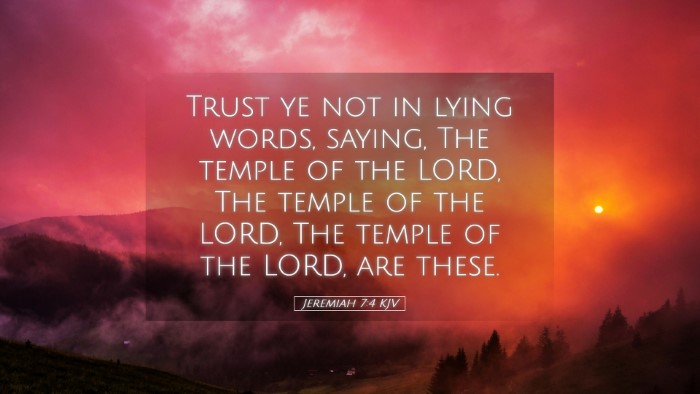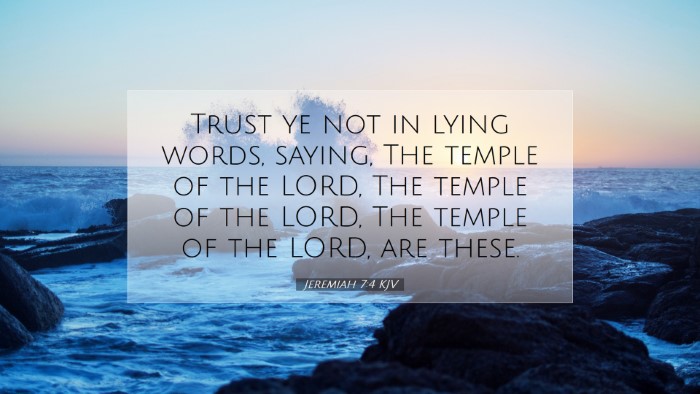Bible Commentary on Jeremiah 7:4
Verse Context: Jeremiah 7:4 states, “Do not trust in these deceptive words: ‘This is the temple of the Lord, the temple of the Lord, the temple of the Lord!’” The verse addresses the misplaced confidence of the people of Judah in the mere presence of the temple as a guarantee of God’s favor.
Introduction
This commentary synthesizes insights from several public domain scholars, including Matthew Henry, Albert Barnes, and Adam Clarke, providing a comprehensive analysis of Jeremiah 7:4. The verse not only reflects the historical and theological contexts of the time but also serves as a timeless warning against superficial religiosity.
Exposition of the Verse
Jeremiah's prophetic declaration is critical in understanding the situation in Judah prior to the Babylonian Exile. The people believed that their physical connection to the temple provided them an assurance of God’s protection and blessing, irrespective of their moral and spiritual condition.
Matthew Henry's Insights
Matthew Henry elaborates on the misconception surrounding the temple, emphasizing that worthiness is not found in rituals or locations but in a genuine relationship with God. He states:
“They trusted in the temple and its services, thinking that the mere possession of it would secure their peace, but they overlooked their iniquities.”
Henry’s commentary stresses the importance of sincerity in worship and warns against the complacency bred by ritualism.
Albert Barnes' Perspectives
Albert Barnes provides a critical analysis of the phrase "the temple of the Lord." He points out that the repetition signifies a fervent but misguided reliance on the temple as a talisman for security. Barnes notes:
“The Jews believed that the temple would protect them like a fortress, not recognizing that their true safety lay in obedience to God's commands.”
This perspective underscores a theological principle that applies both in ancient Israel and today: security stems from righteousness rather than rituals.
Adam Clarke's Commentary
Adam Clarke offers additional exegesis by representing the people's attitude as one of superficiality. He remarks:
“Their trust was indeed in God, but it was in a form of godliness that excluded true obedience.”
Clarke’s interpretation resonates deeply with contemporary applications where individuals might rest in a nominal faith disconnected from active discipleship.
Theological Implications
The issues highlighted by Jeremiah are multifaceted, possessing both historical and ongoing relevance. The commentary emphasizes several theological implications of Jeremiah 7:4:
- False Security: Many believers today may feel secure due to church membership or participation in rituals, paralleling the Israelites’ trust in the temple.
- The Necessity of Authenticity: Genuine faith requires more than observance of practices; it demands a heartfelt commitment to God’s will.
- Covenantal Relationship: God’s covenant calls for a response from His people that reflects their allegiance through ethical living and social justice.
- Judgment and Hope: This prophetic warning is also a call to repentance, indicating that judgment is contingent upon the actions of the people.
Practical Applications
For pastors, students, theologians, and scholars, the lessons embedded in Jeremiah 7:4 carry significant weight. Addressing both communal and individual faith practices, the following applications can be drawn:
- Examine Spiritual Foundations: Faith should be examined and rooted in personal and collective integrity rather than mere tradition.
- Encourage Discernment: Believers are urged to develop discernment regarding their reliance on structures over spiritual substance.
- Preach Justice and Righteousness: The message of the church must advocate for social justice, emphasizing that worship extends beyond the sanctuary.
- Revisit the Nature of Worship: Worship should not become a routine; rather, it should reflect an ongoing relationship with God.
Conclusion
Jeremiah 7:4 serves as a pivotal reminder of the dangers of placing trust in religious institutions and external symbols instead of in the living God. Through the insights of Henry, Barnes, and Clarke, we are encouraged to reflect on our spiritual posture and to cultivate authenticity in our worship practices. The prophetic call remains relevant, urging a transformative commitment to God that transcends mere ritual. As such, this verse calls every believer towards a deeper, more genuine engagement with their faith.


